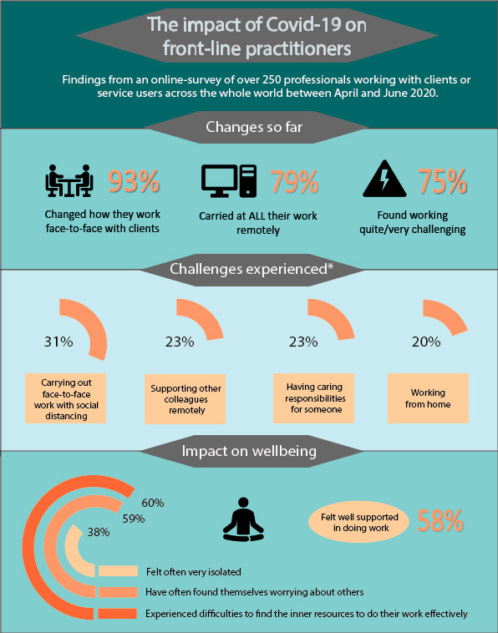COVID-19 has changed the way front-line practitioners work during the pandemic and is likely to lead to substantial changes to the way they work in future.
From April to June this year, we conducted an international online survey of just over 250 professionals and qualitative interviews with 14 individuals that explored how the pandemic has impacted them.
While 80% of our survey participants pre-COVID worked with clients including organisations, groups and individuals face-to-face, almost all (93%) were forced to change their working practices as a result of the crisis. In fact, 79% said they were now carrying out all their work remotely.
Such a radical change in working practices for front-line practitioners, which included teachers, therapists, organisational consultants, coaches and researchers (from across public, not-for-profit and private sectors) in our sample, was challenging for many of them. As can be seen in Figure 1 below, three-quarters (180) had found their work ‘quite or very challenging’ over the last few weeks before they completed the survey.
Of these 180:
- 31% found ‘carrying out face-to-face work with social distancing’ challenging;
- 23% found ‘supporting other colleagues remotely’ challenging;
- 23% found ‘having caring responsibilities for someone in their household (e.g. a child or parent)’ challenging;
- 20% found ‘working from home’ challenging.
A therapist working in private practice described some of the challenges of this new way of working:
‘You have to use different senses to interpret how the client is feeling as they’re not physically in the room with you. Silences on Zoom feel a lot longer than they do in person and you have to concentrate more when the person isn’t right in front of you. It’s easier on Zoom than on the phone though as you still have that sense of seeing the person in front of you and you have to learn to interpret their responses in different ways, e.g. what does their camera positioning mean.’
They also reported that:
- working remotely is more tiring;
- the lockdown had created greater demand than before;
- maintaining confidentiality has been more difficult when sharing space with another person;
- communicating with others remotely has proved more emotionally draining.
The survey also showed that many people have found it difficult working in isolation during the pandemic – and to find the inner resources to do their work effectively (60%). Interestingly, women were significantly more likely to identify this as an issue than men in our sample.
As can be seen in Figure 1, more than a third (38%) of all respondents also said that they often felt very isolated when carrying out their work. This was more likely to be the case for those who had experienced someone close to them being ill with the virus.
On the upside, for some people, the ‘new reality’ has presented opportunities and different ways of working more effectively.
This is what we heard from one interview participant who works as a professional coach.
They experienced many benefits of working remotely, including spending less time commuting and being able to schedule breaks using an online calendar, such as a 30-minute break between Zoom calls to mentally prepare for the next call, or making space for a one-hour lunch break every day. This coach had expected the lockdown to reduce her workload but had, in fact, gained new clients and projects which was unexpected.
There were no problems using Zoom for the work and they were happy to use it with clients, but she has had to amend coaching practice a bit from working in face-to-face meeting:
‘You always ask how you are and the other person might say: “Yes I’m fine, I had a busy day”. But virtually, I feel it can be much deeper, so I always spend the first minutes asking how people are and really talking about how they are at the moment, not just superficially.’
Examples such as this are the good news – given that the ‘new reality’ is likely to continue with the growing numbers of infections in recent weeks, which has increased people’s concerns about returning to the workplace and other shared spaces. It also shows that the most challenging circumstances can lead to new beginnings and innovations which transform the way we work and live.
Here at the Tavistock Institute, we are learning about and reflecting on our own and others’ experiences of COVID-19 in the world of work. With the latest announcements about a continuing pandemic, our research suggests, as do many other studies, that there is no going back. Looking forward, learning from our findings and sharing them we hope will contribute to the longer-term understanding of crisis-responses.
Figure 1:

*of the ones that experienced working quite/very challenging; percentages combine the categories ‘To a considerable extent’ and ‘To a great extent’.
Find out more about the survey here.

